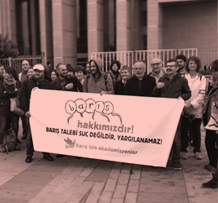
Despite a Constitutional Court ruling that the rights of the Academics for Peace were violated, administrative courts reject the applications for stay of execution regarding the academics' dismissal, according to a report by the Human Rights Foundation of Turkey (TİHV).
More than 2,000 academics were put on trial for signing a 2016 declaration titled, "We will not be a party to this crime," which criticized the human rights violations during the conflict in the Kurdish-majority southeast.
Following the top court verdict last July, 622 of the 822 cases have ended in acquittal. Some courts tend to extend trials and delay acquittal decisions, according to the TİHV.
Also, the academics were not able to return to their duties despite being acquitted, the foundation noted.
During the two-year state of emergency period following the July 2016 coup attempt, 406 academics were dismissed upon statutory decrees, 89 were dismissed "by other means," 72 were forced to resign and 27 were forced to retire, according to the report.
After the state of emergency ended on July 20, 2018, some of the dismissed academics applied to administrative courts, requesting their reinstatement on the grounds that actions taken during the state of emergency could not continue after it was lifted.
However, the applications were rejected despite rulings by the Council of State and the Constitutional Court, which meant that it was up to the State of Emergency Procedures Review Commission whether the academics would be reinstated or not.
The Commission has so far given a decision about the applications of 108,200 of 126,300 people who were dismissed from public service upon statutory decrees. It has rejected 88 percent of the applications.
"The State of Emergency Procedures Review Commission continues to ignore the Constitutional Court's ruling and the numerous verdicts of acquittal given by courts of first instance," the report said.
One of the violations against the Academics for Peace was the confiscation of passports.
While an amendment to the Passport Law on October 24, 2019, allows those who were dismissed from public service upon a statutory decree to acquire a passport, "arbitrary restrictions" have not totally ended because of the procedures and the logic of the regulation, according to the report.
While some academics were able to get their passports back and go abroad, some did not receive a response to their applications, it said.
Reinstatement of rights
The TİHV listed what needs to be done in to prevent further right violations of the academics:
- In cases that still continue at local courts, verdicts of acquittal should be given immediately without new hearings.
- All of the 406 academics who were dismissed upon a statutory decree should be reinstated to their jobs in the institutions they worked at.
- Regulation should be made to prevent the loss of rights for those who were employed as part of the Lecturer Training Program.
- Passport confiscations should be immediately and unconditionally lifted.
- The Higher Education Council (YÖK) should urgently provide the conditions for those who were dismissed by other means that statutory decrees (those whose contracts were terminated or not renewed or those who were forced to resign or retire) to return to their jobs.
- The "blacklist" practice against those who continued their graduate education at the time they signed the declaration should end.
